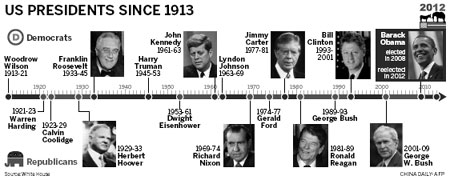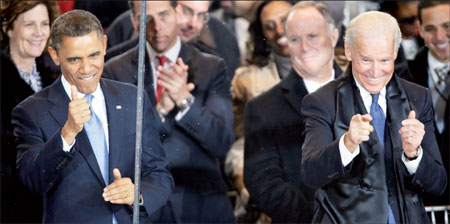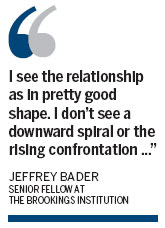Optimism of Sino-US ties grows
Updated: 2013-01-22 11:57
By Chen Weihua in Washington (China Daily)
|
||||||||
|
US President Barack Obama and Vice-President Joe Biden react during the inaugural parade on Pennsylvania Avenue near the White House, on Monday. Gerald Herbert / AP |
|
A large crowd applauds Obama as he is driven to the White House. Bing Li / for China Daily |
Experts say Obama must do more to further relations amid new Asia pivot
As US President Barack Obama was sworn in for his second term, expectations are running high for him to seize the opportunity in better handling China-US relations during the next four years.
Leaders of both nations have already defined their ties as the most important bilateral relationship of the 21st century. Recent months have seen more positive messages from both sides, especially from US officials after last year's presidential campaign, which was rife with tough rhetoric on China.
Obama, in his meeting with Premier Wen Jiabao in late November, described the relationship as "cooperative and constructive".
Xi Jinping, the newly elected general secretary of the Communist Party of China, told former US President Jimmy Carter last month both countries should make efforts to accumulate "positive energy" to build a bilateral cooperative partnership based on mutual respect and mutual benefit. Xi called for creating a new type of relations between major powers, regardless of the difficulties.
While the media has often pointed out conflicts between the two countries, Jeffrey Bader, a senior fellow at the Brookings Institution and a former senior director for East Asia affairs at Obama's National Security Council, said the relationship has been good.
The two largest economies in the world have become each other's second largest trade partner, with bilateral trade approaching $500 billion. Meanwhile, the US has made $70 billion in foreign direct investment in China while Chinese FDI in the US has grown.
China has also become one of the fastest-growing markets for US exports and the biggest market for US farm products. Apple CEO Tim Cook predicted a week ago that China will replace the US as its largest market.
Meanwhile, the number of Chinese students at US colleges and universities has reached a record high of 194,000, a 23-percent increase from a year ago, while the US has embarked on a 100,000-strong initiative to send American students to study in China from 2009 to 2014.
The two countries have become so interdependent that Larry Summers, the former treasury secretary and economic adviser to Obama, said he could picture a 21st century in which the US and China prosper and envision a 21st century in which the US and China do not prosper, but he could not picture a 21st century in which one of the two prospered and the other did not.
In his first term, Obama became the first US president to visit China during his first year in office in 2009 while President Hu Jintao and Vice-President Xi Jinping both visited the US over the last two years.
China and the US have also worked together over the years on a host of global issues, including the nuclear programs in Iran and North Korea, albeit with differing approaches.
"I see it (the state of US-China relationship) as in pretty good shape. I don't see the downward spiral or rising confrontation that I read about frequently in the media and in commentaries, both in the United States and in China," Bader said in Beijing two months ago.
He said while he may be the person who sees the glass half full, he is not unaware of the concerns, including rising tensions from territorial disputes in the South China Sea and East China Sea that could negatively impact the relationship, and the suspicion in China about the motivations behind US' recent pivot toward Asia.
Although US officials, from Obama to Hillary Clinton, have repeatedly said the US' pivot to Asia is not aimed at China and that the US will not seek to contain China and will not take sides in territorial disputes in the South and East China seas, many in China have seen the US move in a different direction.
Zha Daojiong, a professor of international relations at Peking University, believes the US is biased in favor of Japan in the dispute over the Diaoyu Islands. That sentiment is also strong among many Chinese leaders, especially after Clinton recently said that the islands in the East China Sea were covered by the US-Japan security and defense treaty.
Many Chinese believe that the primary goal of the US pivot to Asia is to contain China's rise, both militarily and economically.
They cite the rapid growth of US arms sales in Asia and its aggressive push for the Trans-Pacific Partnership, which would exclude China and unite countries with the US. China, in turn, has been more in favor of another grouping known as the Regional Comprehensive Economic Partnership.
The US' pivot to Asia, which focuses on military strategies but has lately concentrated on economic and trade issues, has also sparked heated debates within the US.
In an open letter to the president last Thursday, Kenneth Lieberthal, a senior fellow at the Brookings Institution, said Obama could do a better job in improving relations with China during his second term by adjusting his rebalancing strategy.
Lieberthal said the US' new Asia strategy, while producing desirable results, is generating dynamics that increasingly threaten to undermine its primary goals.
"It is therefore time to rebalance judiciously and China's leadership change provides you with an opportunity to do so," Lieberthal said.
He said the bilateral relationship is heading in the wrong direction and distrust from both sides has grown since the US' new strategy in Asia began less than two years ago.
In his policy recommendations to Obama, Lieberthal said that nobody in Asia wants to take sides between the US and China.
"All seek 'wise management' of US-China relations. An initiative that improves US-China relations and contributes to regional stability can, therefore, potentially enhance the US position throughout Asia," he said.
Last year, Lieberthal and Wang Jisi, a professor of international studies at Peking University, co-authored a paper on reducing the distrust between both countries. That would "improve the potential for a long-term normal major power relationship between the United States and China, rather than an adversarial relationship that might otherwise develop," he said.
Donald Gross, a senior associate at the Pacific Forum of Center for Strategic and International Studies, said that during his second term, Obama should seize the opportunity created by the emergence of China's new leadership to stabilize US-China relations. He said the US president should pursue a diplomatic strategy that minimizes conflict, emphasizes peaceful co-existence and significantly expands trade and investments between the two countries.
He said the US should keep in mind the profound words of former national security advisor Zbigniew Brzezinski.
"If the United States and China can accommodate each other on a broad range of issues, the prospects for stability in Asia will be greatly increased. The United States must recognize that stability in Asia can no longer be imposed by the direct application of US military power. Indeed, US efforts to buttress Asian stability could prove self-defeating, propelling Washington into a costly repeat of its recent wars, potentially even resulting in a replay of the tragic events of Europe in the 20th century".
Chinese pundits are also placing high hopes on Obama's second term.
Jia Xiudong, a senior researcher at the China Institute of International Studies, believes a lot of issues between China and the US were exaggerated during the US presidential election campaign last year.
"This year should be a good opportunity to improve the relationship since there is no election pressure," Jia said.
During Obama's second term, Jia said China would hope there will be less interference from US domestic politics on bilateral relations, especially with economic and trade ties.
He also hopes the US takes measures to lift export controls on China and respect China's interests on issues involving Taiwan and Tibet.
For years, US arms sales to Taiwan and meetings with the Dalai Lama have triggered outrage in China. While US officials often argue that these actions have been going on for many years, Chinese leaders have increasingly regarded these actions as interference to their sovereignty and internal affairs.
But Brzezinski, the former US national security adviser, believes that China and the US have effectively managed their differences.
"My sense is that at least those who shape policies in both countries now realize there is a kind of de facto partnership between China and America and that it is in our mutual interest for the disagreement not to get out of hand," he said.
Bader said there is optimism for a smooth relationship from new Chinese leader Xi Jinping.
He recalled a meeting between secretary of state Madeline Albright and president Jiang Zemin in 1997, in which Jiang said that when he first became general secretary, Deng told him, "You are responsible for China-US relations".
Bader said Deng and Jiang clearly viewed the relationship as one of the essential responsibilities as the leader of the party. He said Hu Jintao similarly took responsibility for the relationship.
"I expect nothing less from Xi," Bader said.
Some, such as Donald Gross of CSIS, have observed positive signals from Obama's nomination of two key cabinet members, John Kerry as secretary of state and Chuck Hagel as secretary of defense. Both have supported greater cooperation between the two countries and favor diplomatic resolutions of conflicts.
"The simple fact is that we need China, and China needs us. We have to get this relationship right. After all, we are talking about our connection to one-sixth of humanity. The most serious problems we face today, from nuclear proliferation to climate change, can't be solved alone. And, economically, our futures are deeply intertwined and will remain so," said Kerry, who is widely expected to be approved in a Senate hearing on Thursday.
Kerry also criticized that the tendency to demonize China, to consider it the next great threat, isn't based in reality.
The Atlantic Council, which is chaired by Hagel, issued a report a month ago saying that the US' strategy to deepen cooperation with China is the most crucial single factor that will shape the world.
The report suggested that the US strategy should accommodate legitimate, essential Chinese interests just as China will need to make reciprocal adjustments in regard to US interests. It urged both countries to work together to avoid the historic pattern of a rising power posing a strategic threat to the status quo.
Cheng Guangjin and Pu Zhendong contributed to this story.
chenweihua@chinadaily.com.cn


 In Photos: 7.0-magnitude quake hits Sichuan
In Photos: 7.0-magnitude quake hits Sichuan
 Li Na on Time cover, makes influential 100 list
Li Na on Time cover, makes influential 100 list
 FBI releases photos of 2 Boston bombings suspects
FBI releases photos of 2 Boston bombings suspects
 World's wackiest hairstyles
World's wackiest hairstyles
 Sandstorms strike Northwest China
Sandstorms strike Northwest China
 Never-seen photos of Madonna on display
Never-seen photos of Madonna on display
 H7N9 outbreak linked to waterfowl migration
H7N9 outbreak linked to waterfowl migration
 Dozens feared dead in Texas plant blast
Dozens feared dead in Texas plant blast
Most Viewed
Editor's Picks

|

|

|

|

|

|
Today's Top News
Live report: 7.0-magnitude quake hits Sichuan, heavy casualties feared
Boston suspect cornered on boat
Cross-talk artist helps to spread the word
'Green' awareness levels drop in Beijing
Palace Museum spruces up
First couple on Time's list of most influential
H7N9 flu transmission studied
Trading channels 'need to broaden'
US Weekly

|

|










